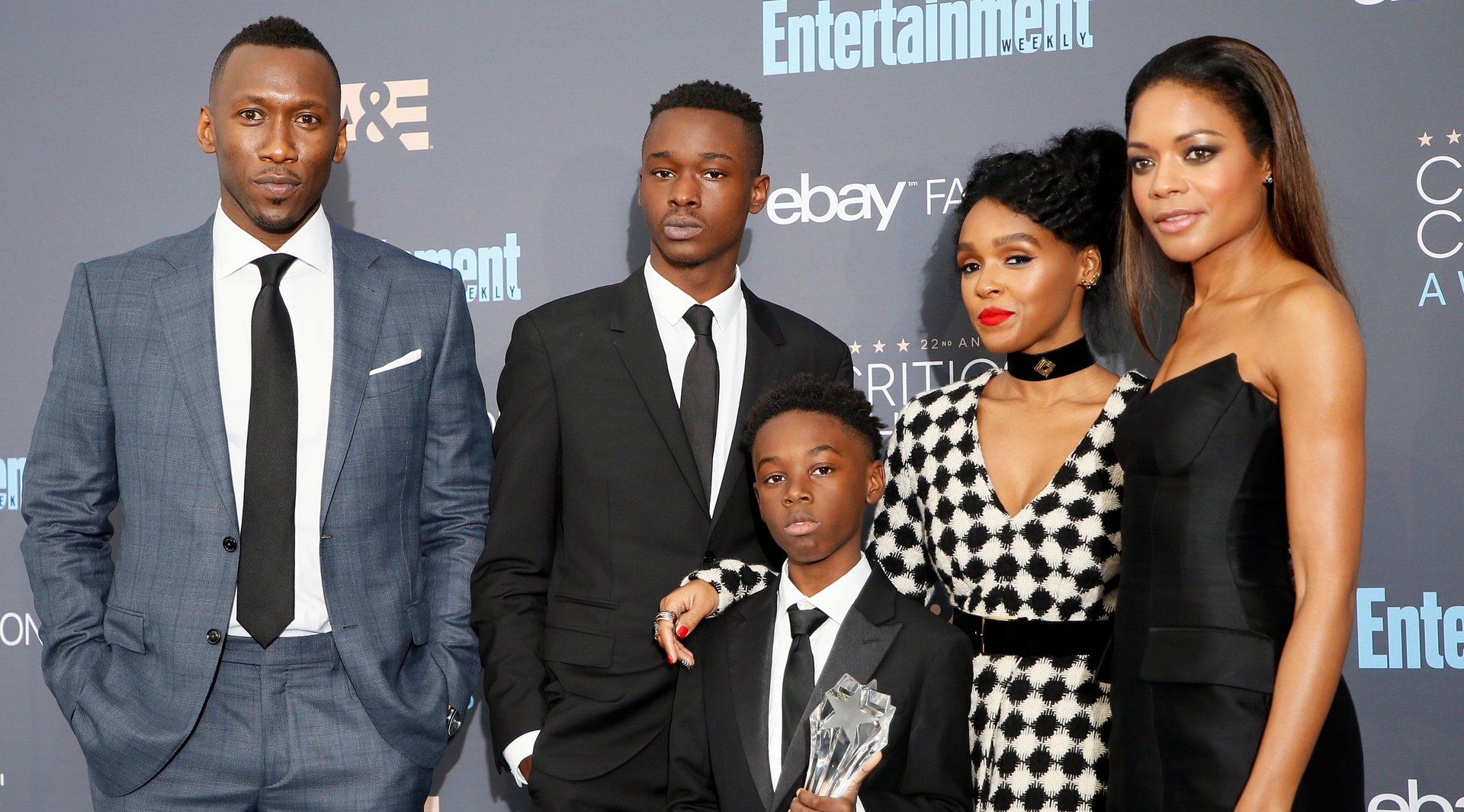“Moonlight” is the best movie of 2016. But will white America watch it?
How were our lives shaped by external forces we couldn’t control? And are are we really the people we’ve always wanted to become?


How were our lives shaped by external forces we couldn’t control? And are are we really the people we’ve always wanted to become?
The Golden Globe-nominated film Moonlight—directed by Barry Jenkins and based on a play by Tarell Alvin McCraney—encourages its audience to ponder these questions and more as it chronicles three distinct stages in the coming-of-age story of Chiron, a black, queer protagonist (played by Alex Hibbert, Ashton Sanders, and Trevante Rhodes).
Moonlight’s message couldn’t be more necessary in a year rife with debate over the importance of so-called identity politics. During its roughly two-hour runtime, the film presents moviegoers with authentic portrayals (not tropes) of what it means to live at multiple marginalized intersections of race, gender, sexuality, and class. These categories, usually fraught with social divisions, don’t generally allow for an honest examination of unfamiliar people and experiences. Moonlight’s ability to disarm its audience while keeping the focus on some of the most vulnerable people in American society makes it far and away the best movie of 2016.
From early childhood through to adulthood, Chiron grapples with his sexuality and masculinity amidst the confines of a tough Miami neighborhood. But at every turn, his attempts at self-discovery and personal growth are stymied by the limitations of other people—be they his peers, his mother, or school administrators.
This struggle is typified by one of Chiron’s formative childhood moments. Early on in the film, Chiron is chased by bullies shouting epithets such as “sissy” and “faggot,” despite not yet knowing (let alone revealing) his sexual orientation.
As his tormentors throw sticks and rocks at the windows, Chiron takes shelter in an abandoned apartment. For Chiron, this is a “safe space,” albeit precarious. But it’s also where he unwittingly meets Juan, a neighborhood drug dealer who looks every bit the part of the idealized black man. Juan (played by Mahershala Ali) sports a do-rag, gold grills, and has a powerful physical presence—tall, broad-shouldered, and brimming with undeniable swagger. Juan recognizes Chiron is a lost and terrified child, and takes it upon himself to ensure Chiron’s safety.
Juan and his girlfriend Teresa (Janelle Monae) welcome Chiron into their home—where for the first time Chiron feels nurtured and cared for. It is here, in fact, where he learns that there’s nothing wrong with who he is, or who he might become. And it is also here where Chiron finds the space to let down his guard. Despite his prickly exterior, Juan doesn’t try and toughen him up.
In contrast, Chiron’s single mother (Naomie Harris) struggles with drug addiction. Her ability to care for herself diminishes with time and, for much of Chiron’s life, she isn’t able to offer the care and understanding he so desperately needed from a parent.
As an adolescent, Chiron has his first male-to-male sexual encounter with Kevin, a childhood friend. Naturally more aggressive, Kevin is able to pass as straight more easily. By portraying himself as an alpha male, Kevin is shielded from suspicion. Chiron is not. His inability to assimilate makes him a persistent target for bullies—eventually giving way to a stunning, violent betrayal that forces Kevin to choose between his friend and his social standing.
That choice places both Kevin and Chiron at a crossroads for the remainder of their adolescence. Each of them, in a way, was a source of respite for the other amidst the forces constantly pressuring them to conform to an otherwise incongruent definition of what it means to be a man. Yet both of these men don’t fully understand what they meant to each other until they reunite in adulthood.
The lack of safe spaces for reflection is a consistent theme throughout the film, which director Jenkins highlights using intentional gaps in narrative. In the final section of Chiron’s story, this lack of personal growth becomes painfully obvious. In one pointed exchange, Kevin asks, “Who is you, Chiron?” It is a question left lingering and unanswered by the film, as the character seems unable to articulate an appropriate response.
Moonlight’s unrelenting soul-searching—together with the blockbuster performances of its relatively unknown cast—makes it one of the best movies of the year. Rarely does Hollywood force viewers to look so deeply inward. When enduring social repression, how important is self-reflection? How would our lives be changed if we were able to live out the elements of our truest selves? As with Chiron, the answers may not arrive immediately.
Moonlight is perhaps most successful in its unapologetic centering of black, queer experiences—a choice made loud and clear with the opening musical selection of Boris Gardner’s 1973 song, “Every N*gger Is a Star.” Coupled with a deeply resonant depth of emotion and humanity, Jenkins has crafted a very American film that could not come at a better time.
The film plumbs deep emotional depths in its exploration of reconciliation, love and affinity amidst heartlessness and prejudice, and self-discovery. Moonlight calls the audience to reflect and, most importantly, to hold themselves accountable for who they become.